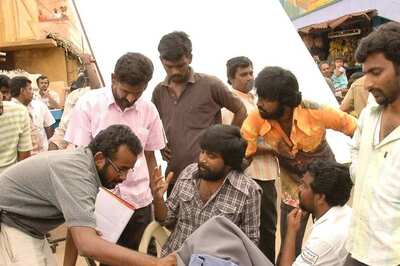
views
By Ben Klayman DETROIT (Reuters) - The National Basketball Association could not sit idly by while the New Orleans Hornets' losses mounted and risk a fire sale that would weigh on the values of all its teams. The NBA said on Monday it was buying the money-losing team from majority owner George Shinn after a minority partner decided not to proceed with a deal. Who will ultimately own the team, which began its life in Charlotte, North Carolina, and where it will play are to be determined, but the U.S. sports league will now more directly control how much it sells for, bankers and analysts said. "The NBA really was largely forced to act," said David Carter, executive director of the USC Sports Business Institute and author of the book "Money Games." "They needed to provide a tourniquet of sorts so they could buy time. "The worst thing that can happen to any franchise is to remain in flux," he added. "All that does is compound current problems." The move will mark the first time the NBA, with annual revenue of $4.3 billion, has purchased one of its 30 teams, but such an approach has been taken before in other leagues. The National Hockey League bought its team in Phoenix out of bankruptcy for $140 million in 2009 and is nearing a deal to sell it to Chicago financier Matthew Hulsizer. In 2002, Major League Baseball bought the Montreal Expos and negotiated construction of a ballpark in Washington before later selling the club for a profit. "There is ample recent history for the major leagues to purchase franchises as part of a broader transaction geared toward ultimate stability," said Rick Horrow, a sports lecturer at Harvard Law School. "Leagues always look at the bigger picture. "Ultimately, Commissioner (David) Stern is a master at protecting his assets and the interests of the owners," added Horrow, who also wrote "Beyond the Box Score: An Insider's Guide to the $750 Billion Business of Sports." Terms of the Hornets deal were not disclosed, but analysts figure the NBA got a good price on the debt-laden club. Forbes magazine last year ranked the Hornets as the 28th most valuable franchise in the league at $267 million. Several analysts estimated the Hornets' annual losses at around $20 million. Stern, speaking to reporters on Monday afternoon, said the NBA would not rush to sell the Hornets, which he preferred remain in New Orleans. He said the team has been valued at more than $300 million and the NBA would turn a profit in any sale. "It's a very good investment for the league," he said. "We're confident that whatever we decide to do here it will not be harmful to the overall league or franchise values." If the league had not stepped in, a bargain price or worse, a bankruptcy, could have resulted, analysts and bankers said. "This was a fairly pre-emptive move by the NBA to avoid having this team go into bankruptcy and avoid having it sold in desperation by the team owner to somebody who would clearly want to move the team out of New Orleans," said Marc Ganis, president of consulting firm Sportscorp Ltd. The Hornets began play in 1988 in Charlotte. After moving to New Orleans in 2002, they played two seasons in Oklahoma City, Oklahoma, after Hurricane Katrina damaged much of the city. Some analysts said the Hornets are only worth the $300 million Stern said if they are based in another city, pointing to an arena lease that runs only through 2014 and an opt-out clause that could be triggered earlier by weak attendance. Stern is leaving all options open, suggesting the city and state of Louisiana may need to provide some type of financial aid, while adding any move to another city would potentially result in a relocation fee. Andrew Zimbalist, professor of economics at Smith College in Northampton, Massachusetts, said other cities including Seattle, Kansas City, Las Vegas and St. Louis could be options, but the NBA may wait for the economy to improve first. "The NBA will probably just sit on this and see if any of those cities come forward with a very attractive arena option," he said. Some analysts also wonder whether the Hornets could be a candidate for contraction, a topic Stern has discussed before when talking about ongoing labor talks with the players' union. He said in October the NBA was headed for losses of around $350 million this season. The current collective bargaining agreement with the players is set to expire in June when a lockout is widely expected. Stern said a sale could occur after a new deal is reached. (Reporting by Ben Klayman in Detroit, editing by Matthew Lewis)



















Comments
0 comment